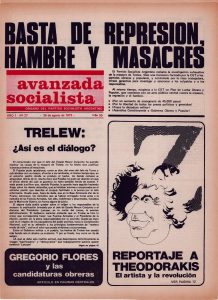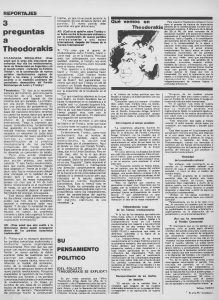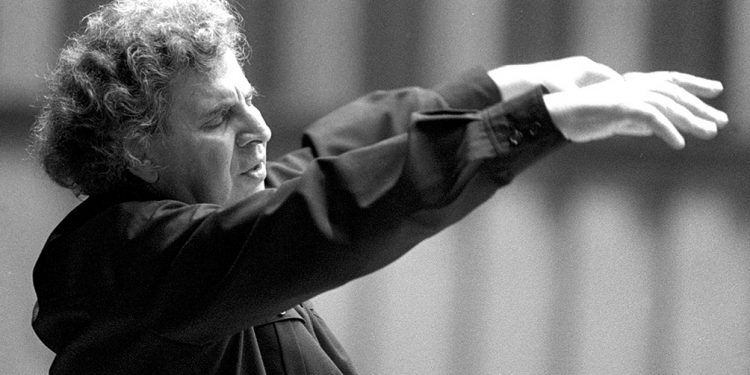By Miguel Sorans, a leader of the Socialist Left and the IWU-FI.
3rd September 2021
The great Greek musician Mikis Theodorakis, immortalised by the music in Zorba the Greek (1964) with the unforgettable scene of Anthony Quinn dancing, died at 96 in the capital of his native Greece.
The new generations may know little or nothing about him. Mikis Theodorakis was one of the musical geniuses of the 20th century and committed from his youth to many of the struggles of his time, especially against Nazism, fascism and dictatorships. He fought against the Greek colonels who ruled his country between 1967 and 1974. He combined his vast musical output with a political activist as a member of the Greek Communist Party. Fed up with the Soviet bureaucracy and its persecution of freedom of expression and artistic freedom, he finally broke with the GCP in 1972, together with other personalities of art and culture. Unfortunately, Theodorakis’ political career then swung further and further away from the left. In 1989, for example, he was an independent candidate for the centre-right New Democracy party, which earned him much criticism from the left. He came and went into politics. At 89, he met the representative of the centre-left Syriza government to demand that it annul all the memorandum measures and reject the austerity plan the Troika demanded.
But beyond these oscillations and our political differences with Mikis Theodorakis, we must acknowledge an artist who has been one of the talented artists. Nor can we ignore his years of militancy for democratic causes, for human rights and against dictatorships. He suffered persecution and imprisonment for this.
During the Second World War, he abandoned his studies to join the Greek resistance forces against the occupation of the Axis troops (1943). In 1941 he composed his first song, Captain Zacharias, on the Nazi-Fascist invasion; it later became the anthem of the Hellenic resistance.

After the defeat of Nazism, a civil war broke out in Greece, with the British intervening to prevent the communist-led guerrillas from taking power. Theodorakis was part of this new popular resistance. He went to jail from 1947 to 1953. The military dictatorship detained him from 1967 to 1970; they banned his music, so he fled to Paris and lived in exile there. He eventually returned to Greece in 1974. Together with the actress and singer Melina Mercouri, he was the symbol of resistance to the dictatorship in Greece.
His film scores include Zorba the Greek, Zeta (1969), State of Siege (1972), which denounced the Greek dictatorship, and Serpico (1973).
Some consider his masterpiece to be the Mauthausen Trilogy (or ballad). Based on the tragic experience of the Greek poet Iakovos Kambanellis in the Nazi concentration camp. Theodorakis also set to music the Spanish Federico García Lorca’s “Romancero Gitano” (Gypsy Ballads) and the Chilean Pablo Neruda’s “Canto General”.
In August 1972, Theodorakis visited Argentina for a musical performance at Luna Park as part of a tour amid his exile in Paris. We were living through the last stretch of the military dictatorship of Agustín Lanusse, who had been forced, by the Cordobazos, Rosariazos, Tucumanazos and other social outbursts in Argentina, to call a general election. Theodorakis had caused worldwide political turmoil by resigning from the Greek Communist Party in March of that year. In that context, our revolutionary socialist current, headed by Nahuel Moreno, who had always fought against Stalinism, interviewed him for our weekly of those years, Avanzada Socialista. A few months later, we would launch the PST (Socialist Workers Party). We wanted to know his views on that split and his opinion on building new revolutionary parties. Theodorakis agreed to the meeting. Ernesto Gonzalez, Mercedes Petit, and I interviewed him. He met us in the hotel lobby where he was staying. This report was published in our weekly Avanzada Socialista Nº 27, 30th August 1972. Almost 50 years ago.

His caricature and a Z on the back, recalling the film against the Greek dictatorship, were on the cover. Days before his Luna Park presentation, we went to his rehearsal to ask permission to display a banner demanding Hugo Blanco’s freedom (Peruvian peasant leader). He agreed without a hitch.
At his death, we remember the brilliant musician and fighter against Nazism and Greek dictatorships, Mikis Theodorakis.













